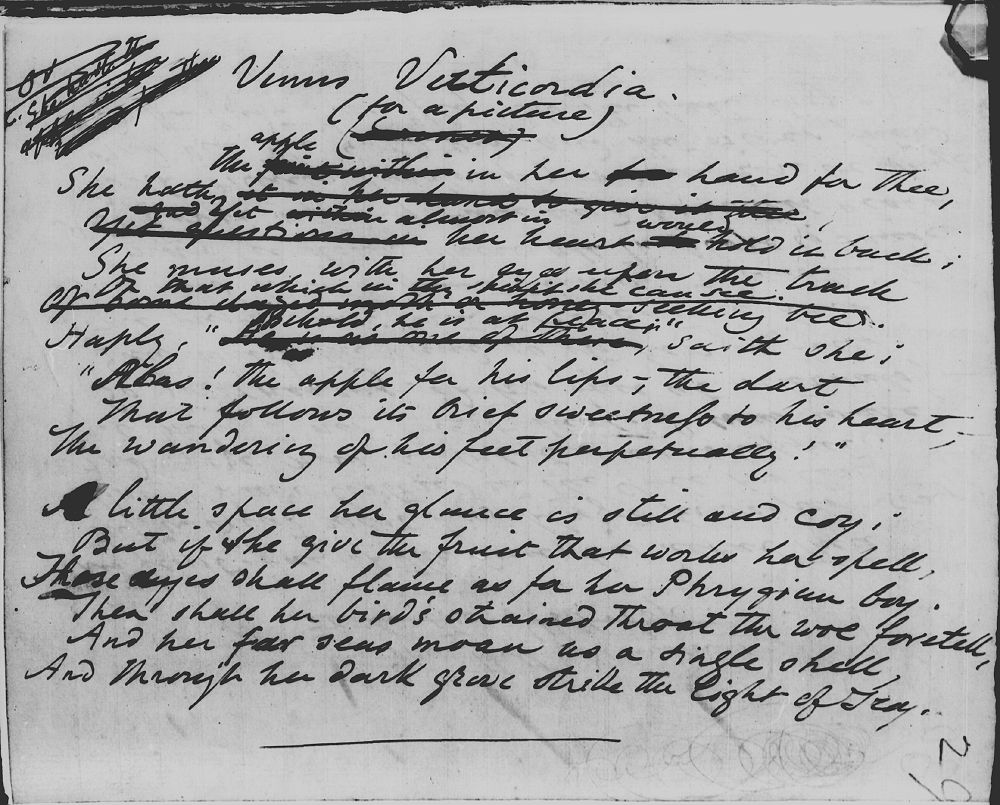The Goddess of Love and Beauty: Dante Rossetti's Venus
Amanda Stancati and Eva Ho
1310
Analyzing the text of "Venus Verticordia"
She hath the apple in her hand for thee,
Yet almost in her heart would hold it back;
She muses, with her eyes upon the track
Of that which in thy spirit they can see.
Haply, ‘Behold, he is at peace,’ saith she;
‘Alas! the apple for his lips,—the dart
That follows its brief sweetness to his heart,—
The wandering of his feet perpetually!’
A little space her glance is still and coy;
But if she give the fruit that works her spell,
Those eyes shall flame as for her Phrygian boy.
Then shall her bird's strained throat the woe foretell,
And her far seas moan as a single shell,
And through her dark grove strike the light of Troy.
Yet almost in her heart would hold it back;
She muses, with her eyes upon the track
Of that which in thy spirit they can see.
Haply, ‘Behold, he is at peace,’ saith she;
‘Alas! the apple for his lips,—the dart
That follows its brief sweetness to his heart,—
The wandering of his feet perpetually!’
A little space her glance is still and coy;
But if she give the fruit that works her spell,
Those eyes shall flame as for her Phrygian boy.
Then shall her bird's strained throat the woe foretell,
And her far seas moan as a single shell,
And through her dark grove strike the light of Troy.
|
The painting, Venus Verticordia, elicits biblical and mythological references that can be interpreted in light of the poem by Rossetti. With motifs like the apple, halo, flowers, and arrow, each explicitly representing something more, the relationship between the poem and painting leave room for discussion.The apple is a significant aspect of the painting. It is a reference to the apple from the forbidden tree of knowledge that Eve ate in the Garden of Eden that caused the fall of man and original sin. Additionally, it is a reference to the apple that Paris offered Venus in Greek mythology in appreciation of her exquisite beauty. The first two lines of the poem develop the idea of temptation and can be interpreted in many different ways. Venus possesses the apple, or symbolically, the power to defy God, gain knowledge, exercise her sexuality, and influence Adam, or men in general. But, in the case of Paris and Venus, the apple is used as a sign of beauty. Yet in the poem, Venus is hesitant to give the apple away, demonstrating her ambiguous nature that will later be discussed further. The apple is referred to as a “dart,” having negative connotations, and is meant to be aimed at a target, in which the sweetness is only momentary and then pain prevails. In the second stanza, it is stated that the apple “works [Venus’] spell.” This reference to a ‘dart’ and the concept of a ‘spell’ demonstrates the female power associated with knowledge, beauty, and sexuality, but is always followed by 'woe'. Although Venus is hesitant to give the apple away, she exercises her freedom in doing so, and is triumphant over the man. |
This triumph is related to the reference to Troy in the last line of
the poem: “And through her dark grove strike the light of Troy.” Venus
is represented as “dark” and Troy is “light.” This contrast between
light and dark suggests Venus’ debased nature, while Troy is lit, after
winning the battle over the Greeks. Rossetti believed the myth of Troy
to be powerful in allegorical meaning.@McGann, Jerome J. "Commentary for Venus Verticordia (For a Picture)". The Rossetti Archive.2008. Web.
Ultimately, Venus was able to overcome the darkness.This contrast of
light and dark further reiterates Venus’ ambiguity. She is neither evil
nor a fragile woman.@McGann, Jerome J. "Commentary for Venus Verticordia (For a Picture)". The Rossetti Archive.2008. Web.
Her appearance in the painting is soft, yet the poem reveals her
feminine powers and strength. It is interesting to note the irony in
the use of both an apple and a halo in the painting. The apple denotes
sexuality, while the halo denotes angelic qualities. The flowers and
arrow can also represent sexuality. The flowers are a sign of fertility
while the arrow is associated with Cupid, the god of love, but more
specifically, of sexual love. Furthermore, the dominant colour of the
painting is red which denotes sin and power.


